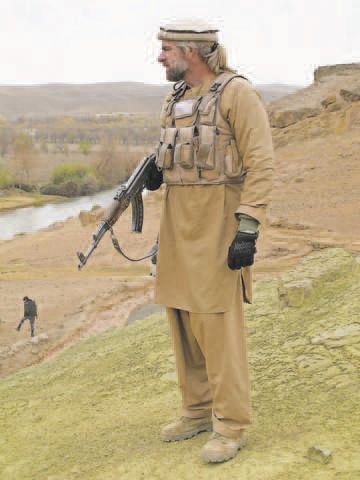By Lea Kahn, Staff Writer
In the dead of night, on the day after New Year’s Day 1777, Lawrence Township patriot Ezekiel Anderson led Continental Army troops on a circuitous route from Trenton to Princeton, culminating in the Battle of Princeton.
Now, 240 years later, Mr. Anderson’s direct descendant — former U.S. Marine Corps infantry officer Capt. Thomas O’Neil III — will follow in his footsteps and retrace the long night’s march from Trenton to Princeton, overnight Jan. 2-3, 2017.
“I feel obligated to respect and honor my heritage,” said Capt. O’Neil, who grew up in Hopewell and Lawrence townships. He graduated from Lawrence High School in 1992.
Capt. O’Neil will be joined in “Ezekiel’s March,” which is the name given to the re-enactment, by former U.S. Army Specialist Leo Bridgewater. He is an African-American and will symbolically represent the 25 percent of northern Continental Army soldiers who were also African-Americans.
Capt. O’Neil, who now lives in Florida, and Spc. Bridgewater, who lives in Trenton, served several tours in Iraq and Afghanistan. They both have left active military duty.
Capt. O’Neil and Spc. Bridgewater will begin their march after a special church service at 9:30 p.m. Jan. 2 at the First Presbyterian Church of Trenton at 120 E. State St. The church is significant to Capt. O’Neil because his Anderson ancestors were among its founders.
The two men and a handful of other marchers will walk over to the Old Barracks Museum at 101 Barrack St. in Trenton, and begin the all-night, 15-mile trek to the Princeton Battlefield on Mercer Road.
The marchers will follow the historic route taken by Gen. George Washington’s troops through today’s Hamilton and West Windsor townships and into Princeton.
They expect to arrive at the Princeton Battlefield Park around 7:30 a.m., and will place a wreath at the common grave of British and American soldiers who died at the Battle of Princeton.
Capt. O’Neil and Spc. Bridgewater also will honor U.S. Marine Corps Capt. William Shippen, who was killed in action at the Battle of Princeton. Capt. Shippen was the first Marine officer to die in a land battle.
Marines were stationed on shops to provide security, Capt. O’Neil said. A number of Marines and their officers were killed at sea, defending the ships, but Capt. Shippen was the first Marine officer to be killed in a land battle.
Turning to Ezekiel Anderson, Capt. O’Neil said his ancestor was a private in the 2nd Continental Army and grew up in Lawrence Township, or Maidenhead as it was originally known.
Ezekiel Anderson’s father was Capt. John Anderson, who built the family’s home in 1764. Known as the Anderson-Capner House, the house is still standing on the corner of Trumbull and Ohio avenues in southern Lawrence Township.
After the First Battle of Trenton, Private Anderson was interviewed by Gen. Washington about the British positions at Princeton. Knowing that he was familiar with the area, Gen. Washington asked Private Anderson about the back roads of Maidenhead and how to reach Princeton without being discovered by British troops.
Private Anderson agreed to lead the Continental Army from Trenton to Princeton for a surprise attack on the British garrison stationed in Princeton. A combined force of 5,000 Continental Army troops and New Jersey militiamen marched to Princeton and defeated the British troops on Jan. 3, 1777 — one of the turning points of the Revolutionary War.
Private Anderson personally led Gen. Washington into the fight at the Battle of Princeton,and was also at the general’s side when the British surrendered at Yorktown, Virginia.
Capt. O’Neil discovered more about his Anderson ancestors during a recent visit to Princeton. The Anderson family, among the original settles in Maidenhead/Lawrence Township, served in the New Jersey militia.
But that’s not why Capt. O’Neil is marching from Trenton to Princeton.
The Lawrence Township native seeks to remind people that colonists, such as his Anderson ancestors, created a strong country that was united against a common enemy. The United States became one of the most powerful nations in the world.
Capt. O’Neil was galvanized to remind Americans of their heritage and the need to drop the divisiveness and strife that he found when he returned home from Iraq and Afghanistan in 2013.
He found a country that was at odds with itself, divided by race, ethnicity and social class. “Ezekiel’s March” is his attempt to overcome that divisiveness and perhaps begin the healing process.
“Leo and I are doing this (march) to send a message to people that we have to work together. We want to use the march to prove a larger point. A lot of people don’t know that 25 percent of the soldiers in the Continental Army were African-Americans,” he said.
“(The march) might be a way to start a conversation on race. It’s just two veterans doing this — a black guy and a white guy,” Capt. O’Neil said.

